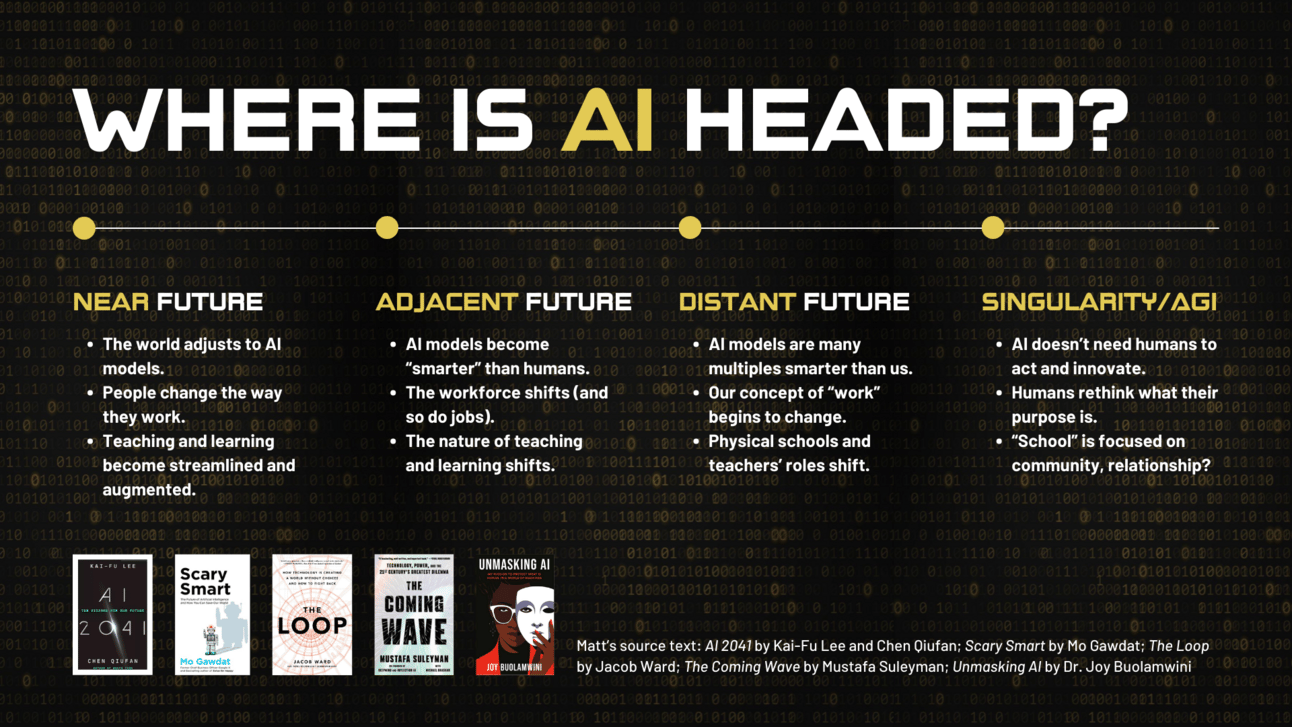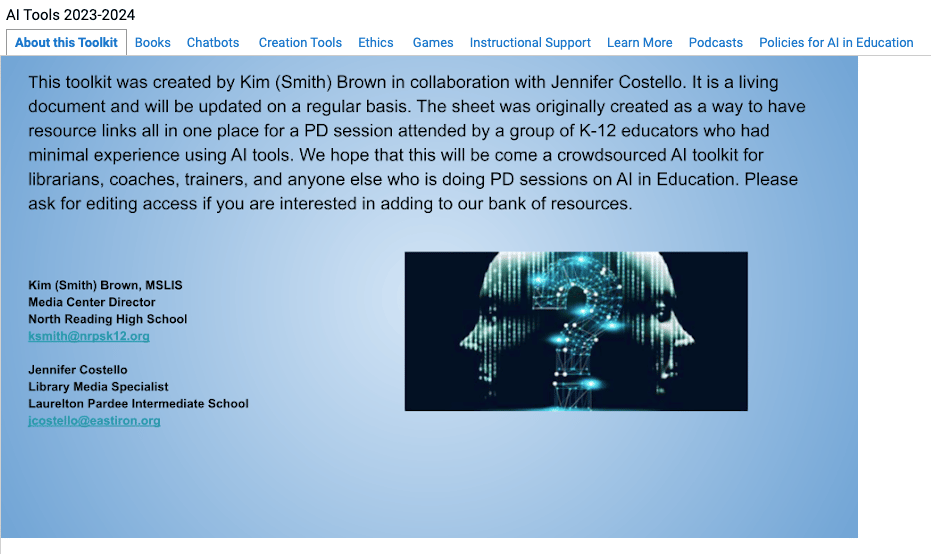
Have you made it to your holiday break yet??? I hope you get some rest and relaxation and some down time!
The Ditch Summit, my free online conference for educators, is LIVE right now … and there are several AI-themed sessions you can go watch RIGHT NOW. (More in a moment.)
Our discussion about AI-related PD was really good this week! Shout out to Paul Dietrich, Kim Brown, Kathy Hansen (with kudos from Cameron Ross and Kristin Mayville), Paul Dietrich, Herb Coleman, Mickie Mueller, John Graf, Jamie Huibbell, and (as always) Caleb J Wilson for their contributions to the discussion board this week.
PS: Remember, we have an AI for Admins community, and you have free access! You can register, access it, and interact with others here.
In this week’s newsletter:
📺 NOW: AI sessions at the FREE Ditch Summit
🗣 DISCUSSION BOARD: AI-related PD
🛠 Kim Brown’s AI toolkit
🗓 This week’s discussion topic
🎙 Quote of the week
📚 New AI resources this week
📺 NOW: AI sessions at the FREE Ditch Summit
The Ditch Summit is our free online conference for educators. It is live RIGHT NOW and stays open until Jan. 5.
All of our new sessions are available to watch now except for one (which goes live tomorrow).
Register at ditchsummit.com to start watching right away.
Here are some of the big AI-related takeaways …

This is a slide from my session, “AI in the Classroom: Today, Tomorrow, and Beyond.” I try to predict what school will look like in light of AI in the …
Near future (0-2 years)
Adjacent future (2-5 years)
Distant future (10-15 years)
Singularity/AGI (beyond that)
Some of the best and brightest thinkers in AI are predicting how the world might change in light of AI. (See my recommended reading list at the bottom of the slide.)
It’s time for us to think about how school will need to adapt when these changes come along.
I make some wild predictions (maybe not so wild …). Even if I’m off, we need to start thinking about these changes sooner than later.

In this session, Demystifying AI with Fely Garcia Lopez, we brainstorm 10 challenges that teachers can try out to start understanding what AI assistants are capable of.
PS: John Graf was talking about exposure in this week’s discussion board … the importance of teachers experiencing AI so they know how to use it. This could be a great way to do that!
A few examples:
Use AI assistants to help write letters of recommendation (then edit the drafts they create so they’re exactly what you want)
“Explain it to a 5 year old” — asking for explanations to specific ages or groups
Ask AI assistants for suggestions on how to learn about AI — and then follow their suggestions!
I highly recommend registering for this free PD (available until Jan. 5), and feel free to recommend any other educators you think would benefit! More: ditchsummit.com
🗣 DISCUSSION BOARD: AI-related PD
This week’s question: What kind of AI-related professional development do you think teachers need most right now?
View the whole discussion here. (It’s not too late to participate!)
Some highlights and summarized responses:
“Before being able to implement in the classroom, teachers need to be able to have PD on the different applications of AI. Then they need time to experiment with how AI can be a timesaver in many ways for lesson prep and scaffolding, etc.” — Kathy Hansen
“Any. They just need some. Larger districts (like mine) are lucky to have someone on staff who's job it is to evaluate new technology and train teachers. And I have been obsessed with AI. So many small districts don't have anyone on staff to do that and teachers are left on their own. This topic is too important to not address it.” — Mickie Mueller
“So a few teachers have encountered writing they suspect is AI written. They know that detectors are imperfect an have not given them conclusive results. They are not sure how to respond without alienating students.” — Herb Coleman
And now, the obligatory “wow go read what Caleb J Wilson wrote” comment in the email newsletter. 😁 This could easily be repurposed as a post on the Ditch That Textbook blog. (Caleb, I may be in touch about that …)
Here’s the summary (read the whole thing here):
INTRO: Tech integration depends on meaningful support.
1ST HURDLE: Awareness (understand what AI / Generative AI are)
2ND HURDLE: Addressing concerns backed by policy and guidance from district leadership 😲
NEXT STEP: Identify tools that align to visions/goals for students
BIGGER PICTURE: A transformation in mindset is needed
WHERE ARE WE GOING?: AI needs to be a catalyst for transformation instead of an enabler of the status quo 💥
🛠 Kim Brown’s AI toolkit
Holy moly Kim Brown! She recently completed the fall 2023 ISTE course: “Artificial Intelligence Explorations and Their Practical Use in Schools.” 👏🏻👏🏻👏🏻
But get this … she and a fellow librarian teamed up to create an 🛠 AI toolkit (and a companion slide deck if you present to educators on AI).

Do you see all of those tabs at the top?!? 🤯🤯🤯
This is a deep resource that took lots of time to curate. (Congrats to Kim and Jennifer!)
Want to add to the toolkit — or use the slides — or collaborate with Kim on the project? Just drop your email in a comment here. (Oh, and Kim … keep an eye on that discussion board!)
🗓 This week’s discussion topic
Here’s this week’s new discussion topic (posted under AI Professional Development):
This week’s discussion topic was suggested by Joseph Pacelli. FYI: Hit reply to this email if you want to suggest a future discussion topic!
How can we enhance better teacher buy in? Most are too comfortable with the status quo. This is very exciting stuff and should change learning in an amazing way.
🎙 Quote of the week
In this vision of an AI-infused school, there will still be plenty for human teachers to do. Teachers will play two important roles:
First, they will be human mentors and connectors for students. Human teachers will be the driving force behind stimulating the students’ critical thinking, creativity, empahty, and teamwork. And the teacher will be a clarifier when a student is confused, a confronter when the student is complacent, and a comforter when the student is frustrated. […]
The second role that teachers will play is to direct and program the AI teacher and companion in ways that will best address the students’ needs. They will do this based on their experience, wisdom, and in-depth understanding of the students’ potential and dreams.
— Kai-Fu Lee & Chen Quifan, AI 2041: Ten Visions for Our Future
📚 New AI resources this week
1️⃣ An Expert Asked AI to Write Like a 4th Grader. Here’s What It Came Up With (via Edweek): The bottom line: AI might not be quite there yet, but it’s clearly on its way to being able to impersonate a 4th grader.
2️⃣ Using Character Chatbots in English Class (via Edutopia): Mike Kentz shares how to use the tool Character.AI to give students insights into the books they read.
3️⃣ New episode of the Digital Learning Podcast (that I co-host with Holly Clark): 5 Essential Skills for an AI Future: In this episode, Holly and Matt chat with Samsung’s Micah Shippee about what we should be equipping students with to thrive in the future.
I hope you enjoy these resources — and I hope they support you in your work!
Please always feel free to share what’s working for you — or how we can improve this community.
Matt Miller
Host, AI for Admins
Educator, Author, Speaker, Podcaster
[email protected]


